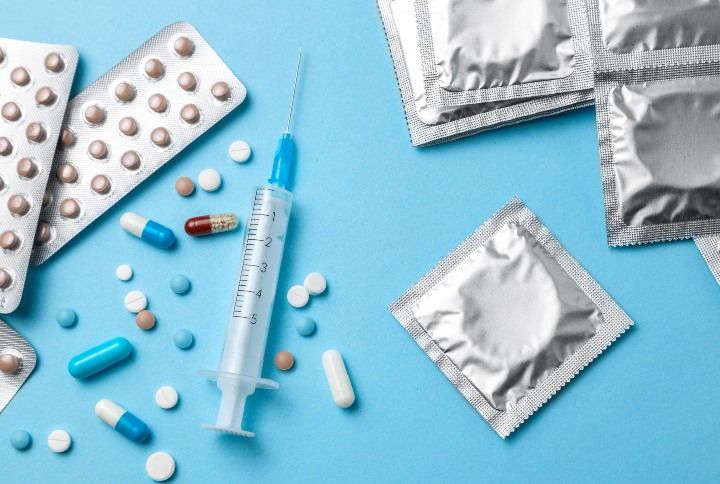Contraception helps prevent unwanted pregnancy. It can also help regulate periods, protect you and your sex partner from sexually transmitted diseases, and more. To facilitate a conversation on this key topic related to women’s health, we invited Dr Tanaya Narendra, Embryologist and Scientist, to host an Ask Me Anything session on Malini’s Girl Tribe. Scroll down to know the answers to some frequently asked questions about contraception!
Q. Can you explain why emergency contraceptives work and why they are not to be taken regularly? What are the lasting effects, if any?
There are two kinds of emergency contraceptives: oral pills like iPill or Intrauterine Devices that are to be inserted at the doctor’s office within 5 days of unprotected sex. They work in a couple of different ways. One way it works is that they stop the ovulation. Basically, they will stop the egg from leaving its house, that is, the ovary. If it’s under house arrest, it can’t go out to meet the sperm.
The other way it works is that they cause changes in the endometrium (the inside lining of the uterus) that makes implantation (attachment of the baby) difficult. Basically, it sets the house on fire! It’s hard for the baby to settle in that house, so it has to immediately leave. The immediate side-effects can be menstrual irregularities, nausea, dizziness, vomiting, tender breasts, and mood swings.
From the data we have so far, it does not cause any lasting effects on fertility. But it’s best to avoid using them regularly because they contain very high doses of hormones. This can disrupt your natural cycle, which is not a great idea.
Q. What is the role of sex hormones in the regulation of the menstrual cycle?
Let’s break down a menstrual cycle into two halves. The midpoint being the ovulation when the egg is released from the ovary. The starting point is your period. The first half of your cycle is when your hormones start rising. It’s mostly the influence of oestrogen, when your body is preparing an egg (not like an omelette LOL, but more like an egg that will make a baby). Under the influence of hormones, your eggs start growing. Each cycle, your ovaries make a number of eggs—one of them becomes the biggest and strongest, and this is the chosen egg for the month. At the same time, your uterus is preparing the inside lining and making it thicker. Once the egg and the uterus are prepared, your body releases the egg. This is under the influence of a hormone called LH, or luteinizing hormone. At this point, your body looks and feels more attractive, so you can find a mate and try and make a baby with them. Our uterus has baby fever like crazy!
Once the egg is released, it will either be fertilised by a sperm, or it will die off. Now your body starts producing progesterone. This is done to support the incoming pregnancy (hopefully! Remember, baby crazy uterus). Under the action of progesterone, your uterus lining is maintained, until your body waits for the pregnancy. After a few days of waiting and no pregnancy, the uterus becomes really sad. It chucks off all the lining on the inside, and this is your period.
Q. Supposing a couple is pregnant and their pregnancy is not that of high risk. If the couple wants to have sex, do they still have to use protection?
As long as either partner doesn’t have any infection, protection is not needed! Presumably, the couple wasn’t using protection and that’s how they got pregnant in the first place!
Q. How safe is the Saheli pill and why is it not approved in any other countries except India?
Let’s do a deep dive into this. Saheli, whose chemical name is Ormeloxifene, has been developed at CDRI, Lucknow. It’s a non-steroidal oral contraceptive. It works in a very interesting way. Instead of giving you additional hormones, it changes the way your body interacts with your existing hormones. Since it changes the way your body interacts with existing hormones, it has some potent non-contraceptive benefits too—it basically makes your bones stronger, and can also help in fibroadenosis of breasts. Not just that, but it also has potential for anti-cancer therapy! The problem encountered with it is that it can cause problems with periods—irregular or missed periods. It also has been linked with (reversible) ovarian cysts. The reason why it’s not FDA approved yet is financial (it’s all about the moolah, baby)! The pharmaceutical company that manufactures Saheli is not based in the USA. FDA approval is expensive, so why would they go out of their way to first establish their company in the USA, and then apply for that expensive FDA approval. There are LOTS of other contraceptive options available for people—you have a big menu, order à la carte!
Q. What do you feel about Bleu condoms?
Bleucondoms are latex-free. They are great for those people who have a latex allergy. Otherwise, standard condoms are just fine.
What are your most pressing concerns when it comes to choosing the right contraception method? Please share it with us in the comments below!
Join Malini’s Girl Tribe on Facebook to be a part of more such conversations!

